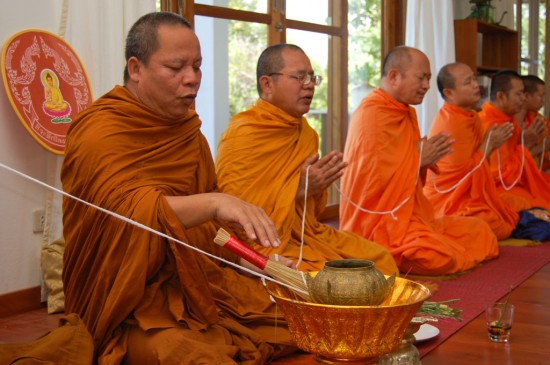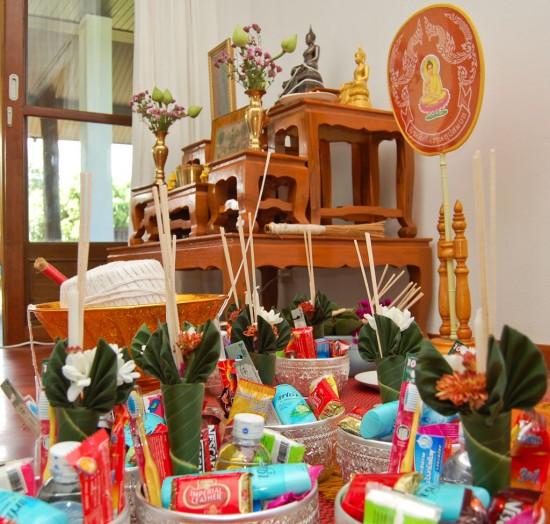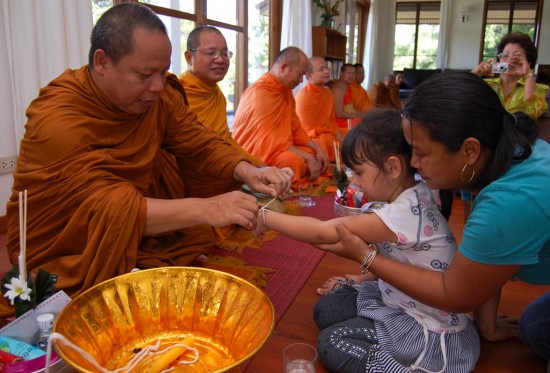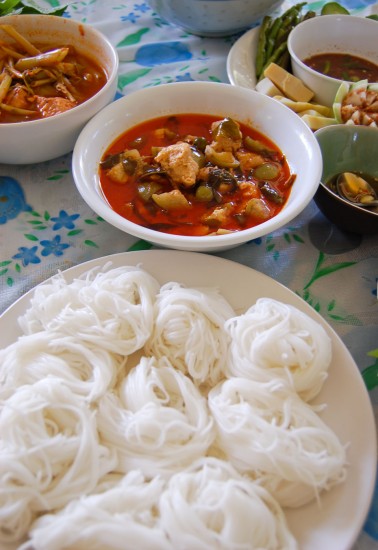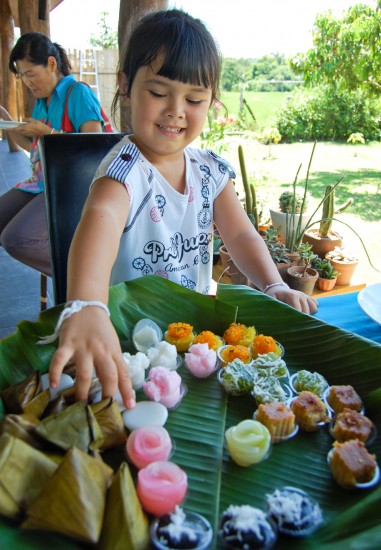Dhammapada Verse 240 Tissatthera Vatthu - One’s Evil Ruins One’s Own Self
AWAKEN ONE WITH AWARENESS ONLINE GOOD NEWS LETTER
Duties of the Buddhist Dhammacari (CONTD)
Atthavisati Buddha Vandana.
ALL ABOUT USA
California
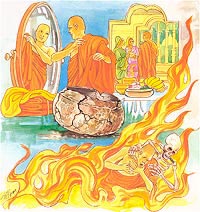
Verse 240. One’s Evil Ruins One’s Own Self
As rust arisen out of iron
itself that iron eats away,
so kammas done beyond what’s wise
lead to a state of woe.
Explanation: The rust springing from iron, consumes the iron
itself. In the same way, bad actions springing out of an individual,
destroys the individual
Dhammapada Verse 240
Tissatthera Vatthu
Ayasava malan samutthitam
tatutthaya tameva khadati
evam atidhonacarinam
1
sani kammani nayanti duggatim.
Verse 240: Just as rust is formed from iron, and corrodes the iron from which
it is formed, so also, his own deeds lead the transgressor to a lower plane of
existence (duggati).
1. atidhonacarinam - transgressor: i.e., one who transgresses or indulges too
much in the use of ‘dhona’, the four requisites of a bhikkhu.
The Story of Thera Tissa
While residing at the Jetavana monastery, the Buddha uttered
Verse (240) of this book, with reference to Thera Tissa.
Once there was a thera named Tissa in Savatthi. One day, he
received a set of fine robes and was very pleased. He intended to wear those
robes the next day. But that very night he died and because he was attached to
the fine set of robes, he was reborn as a louse and lived within the folds of
the robes. As there was no one to inherit his belongings, it was decided that
this particular set of robes should be shared by other bhikkhus. When the
bhikkhus were preparing to share out among themselves, the louse was very much
agitated and cried out, “They are destroying my robes!” This
cry was heard by the Buddha by means of his divine power of hearing. So he sent
someone to stop the bhikkhus and instructed them to dispose of the robes only at
the end of seven days. On the eighth day, the set of the robes which belonged to
Thera Tissa was shared out by the bhikkhus.
Later, the Buddha was asked by the bhikkhus why he had told them
to wait for seven days before sharing out the robes of Thera Tissa. To them the
Buddha replied, “My sons, Tissa had his mind attached to this particular
set of robes at the time of his death, and so he was reborn as a louse and
stayed in the folds of the robes. When you all were preparing to share out the
robes, Tissa the louse was very much in agony and was running about to and fro
in the folds of the robes. If you had taken the robes at that time Tissa the
louse would have felt very bitter against you and he would have to go to niraya.
But now, Tissa has been reborn in the Tusita deva world, and that is why I have
allowed you to take the robes. Indeed, bhikkhus, attachment is very dangerous;
as rust corrodes iron from which it is formed, so also, attachment destroys one
and sends one to niraya. A bhikkhu should not indulge too much in the use of the
four requisites or be very much attached to them.”
Then the Buddha spoke in verse as follows:
| Verse 240: Just as rust is formed from iron, and corrodes the iron from which it is formed, so also, his own deeds lead the transgressor to a lower plane of existence (duggati). |
AWAKEN ONE WITH AWARENESS ONLINE GOOD NEWS LETTER
Duties of the Buddhist Dhammacari (CONTD)
He can conduct the following ceremonies:-
• Pregnency women Pooja:- The Buddha statue decorated in the main hall with 3 types of Flowers, 3 types of Fruits, candles and incense, 5 types of food, can also be kept in front of the statue and recite the protective sutta :-
Mahamangalasutta,
jayamangalagatha,
moraparitta,
karaniyyamettasutta.
Birth and Infant Ceremonies
In Theravada Buddhism, there are certain ritualistic practices
observed when a child is born to Buddhist parents. When the baby is fit
to be taken out of doors, the parents select an auspicious day or
full-moon day and take the child to the nearest temple. They first
place the child on the floor of the shrine room or in front of a statue
of the Buddha to receive the blessings of the Three Jewels (the Buddha,
the sangha and the dharma). This is a common sight at the Dalada Maligawa, the Temple of the Sacred Tooth Relic, in Kandy.
At the time of the daily religious ceremony (Puja) of the temple, mothers hand over their babies to an officiating layman (kapuva)
inside the shrine room, who in turn keeps it for a few seconds on the
floor near the relic chamber and hands it back to the mother. The mother
accepts the child and gives a small fee to the kapuva for the service rendered
• 5th Day of a child Birth:- Buddha pooja is conducted with all the above fecilities
• 4th Month: - Solid food is given to the child before that a Buddha vandana pooja conducted as above.
• Naming of the child:- can be done at any time from 3 months to 11 months, a Buddhist name should be selected and the same is given to the child as usual all the all formalities should be conducted.
• Removing the scalp hair (Head) :- Between One Year and Three Year
Fire Hair Shaving and Khwan Ceremony, Thailand [Still Image]
Annotation
The text and photographs above describe a traditional Thai birth
ritual that celebrates the child’s reaching the milestone of one month
old, at which time its survival seems more assured than at birth, and it
becomes a full-fledged member of the family. Before the infant is one
month old, according to tradition, it may have belonged merely to
spirits. At this time, a Buddhist monk cuts the infant’s hair. “Fire
hair” refers to the hair with which the child was born and that grows
until the end of its mother’s postpartum period of lying in, or lying
near the fire as Phya Anuman described the custom. The photograph shows
the monk cutting or shaving the hair. The hair is placed on a small raft
made of banana leaf and set afloat. The second part of the ceremony
involves tying unspun cotton threads around the child’s wrists and
ankles.
This ceremony of the “khwan,” the soul or life spirit, is a prominent
object of ritual, and the text describing the custom is from Phya
Anuman Rajadhon’s (1888-1969) Customs Connected with Birth and the Rearing of Children
(1948). The author is a prolific and well regarded literary figure and
university professor. Although he did not receive formal academic
training in anthropology, his writings have constituted a major source
for anthropologists and others on customs from Siam, the traditional
name for Thailand. The photographs are from the baby photo album on a
website by Thailand’s most prominent teenage blogger, Panrit “Gor”
Daoruang, who began an online diary at the age of twelve, and chronicled
his own life and aspects of Thai culture and contemporary life, and
teaching both English and Thai language through stories, quizzes and
audio files. The site attracted the attention of the Office of the
National Culture Commission for its value in promoting Thailand’s image
to a worldwide audience.
Source
Photographs: Panrit “Gor” Daoruang at Thailand Life, http://www.thailandlife.com/my-thai-childhood/index.php (accessed November 1, 2009). Text: Phya Anuman Rajadhon, Customs Connected with Birth and the Rearing of Children in Anuman Rajadhon, Life and Ritual in Old Siam; Three Studies of Thai Life and Customs, trans. William J. Gedney (New Haven: HRAF Press, 1961), 171–5. Annotated by Susan Douglass.
• Alphabet Writing: - When child started going to the Pre-School between 18 months to 24 months.
• Pabbajja: - Pabbajja ordination should be given to the child in between 7 years to 10 years.
• Marriage ceremony
Marriage Ceremony

|
Bhante Sujatha with the bride and the bride’s maids |
Chinese Wedding Ceremony Held In Buddhist Monastery

While weddings held in chapels or churches are the norm in the West,
we generally don’t equate Buddhism with marriage. Recently however 30
new couples sought the blessing of a monk at a Chan (Zen) monastery in Zhejiang. Many netizens question whether such ceremony was considered proper in the context of Buddhism or whether this was just all a spectacle.
From Tiexue:
The afternoon of November 21st, 2009, 30
newly to-be-married couples participated in a mass wedding at the
thousand year old Chan (Zen) Temple located at Zhujiwuxie Scenic Area in
Zhejiang Province. The newly to-be-wed couples prayed in front of the
Buddha, and received the highest blessings from the abbot at the Temple.





Although wedding ceremonies have always been regarded as secular
affairs in Buddhist countries, the parties concerned have nevertheless obtained the
blessing from monks at the local temple after the civil registration formalities
have been completed.
In view of the traditional importance that the marriage ceremony has in the West,
moreover, local, and especially isolated Buddhists without access to a temple or a monk
might well adopt the following service that could be performed by relatives and friends of
the bride and groom:
(i) Before a shrine specially erected, complete with a Buddha
image, candles and flowers, the bridal couple and assembly should
recite the Vandana, Tisarana and Pancasila in English
or Pali to be found in the Pali Chanting,
with English translations.
Pali
Chanting in the Theravada Buddhist Tradition
* Basic Pronunciation
Vandanâ
Namô Tassa Bhagavatô Arahatô Sammâ-Sambuddhassa
(3x)
Homage to the Triple
Gems
Homage to Him, the Blessed One, the Exalted One, the Fully Enlightened
One.
Ti-Sarana
Buddham Saranam Gacchâmi.
Dhammam Saranam Gacchâmi.
Sangham Saranam Gacchâmi.
Dutiyampi Buddham Saranam Gacchâmi.
Dutiyampi Dhammam Saranam Gacchâmi.
Dutiyampi Sangham Saranam Gacchâmi.
Tatiyampi Buddham Saranarn Gacchâmi.
Tatiyampi Dhammam Saranam Gacchâmi.
Tatiyampi Sangham Saranam Gacchâmi.
Translation: The
Three Refuges
I go to the Buddha
as my refuge.
I go to the Dhamma - The Teachings, as my Refuge.
I go to the Sangha - The Community, as my Refuge.
For the second time I go to the Buddha as my Refuge.
For the second time I go to the Dhamma - The Teachings, as my Refuge.
For the second time I go to the Sangha - The Community, as my Refuge.
For the third time I go to the Buddha as my Refuge.
For the third time I go to the Dhamma - The Teachings, as my Refuge.
For the third time I go to the Sangha - The Community, as my Refuge.
Panca-sila
Pânâtipâtâ Veramani Sikkhâpadam Samâdiyâmi.
Adinnâdânâ Veramani Sikkhâpadam Samâdiyâmi.
Kâmesu Micchâcârâ Veramani Sikkhâpadam
Samâdiyâmi.
Musâvâdâ Veramani Sikkhâpadam Samâdiyâmi.
Surâ Mêraya Majja Pamâdatthânâ Verami
Sikkhâpadam Samâdiyâmi
Imâni Panca Sikkhâpadâni Samâdiyâmi (3x)
Translation: The
Five Precepts
I undertake to observe
the precept to abstain from destroying living beings.
I undertake to observe the precept to abstain from taking things not
given.
I undertake to observe the precept to abstain from sexual misconduct.
I undertake to observe the precept to abstain from false speech.
I undertake to observe the precept to abstain from liquor causing intoxication
and heedlessness.
I undertake to observe the Five Precepts to the best of my ability.(3x)
Buddha Vandana
Iti pi so Bhagavâ-Araham Sammâ-sambuddho.
Vijjâ-carana sampanno Sugato Lokavidû Anuttarro
Purisa-damma-sârathi Satthâ deva-manussânam
Buddho Bhagavâti
Translation - Homage
to the Buddha
Thus
indeed, is that Blessed One: He is the Holy One, fully enlightened,
endowed with clear vision and virtuous conduct, sublime, the Knower
of the worlds, the incomparable leader of men to be tamed, the teacher
of gods and men, enlightened and blessed.
Dhamma Vandana
Svâkkhato
Bhagavatâ Dhammo Sanditthiko Akâliko Ehi-passiko Opanâyiko
Paccattam
veditabbo viññuhiti.
Translation - Homage
to the Teachings
The Dhamma of the Blessed One is perfectly expounded; to be seen here
and how; not delayed in
time; inviting one to come and see; onward leading (to Nibbana); to
be known by the wise, each for himself.
Sangha Vandana
Supati-panno Bhagavato
sâvaka sangho, Ujupati-panno Bhagavato sâvaka sangho.
Ñâya-patipanno Bhagavato sâvaka sangho. Sâmici-patipanno
Bhagavato sâvaka sangho
Yadidam cattâri purisa yugâni attha-purisa-puggalâ
Esa Bhagavato sâvaka sangho.
Âhu-neyyo, pâhu-neyyo, Dakkhi-neyyo,añjalikaraniyo,
anuttaram puññakkhetam lokassâti
Translation - Homage
to the Disciples of the Buddha
The Sangha of the Blessed One’s disciples has entered on the good way;
the Sangha of the Blessed One’s disciples has entered on the straight
way; the Sangha of the Blessed One’s disciples has entered on the proper
way, that is to say; the Four Pairs of Men, the Eight Types of Persons;
the Sangha of the Blessed One’s disciples is fit for gifts, fit for
hospitality, fit for offerings, and fit for reverential salutation,
as the incomparable field of merit for the world.
Maha-Mangala
Sutta
Êvam mê
suttam êkam samayam bhagavâ Sâvatthiyam viharati Jêtavanê
Anâthapindikassa ârâmê,
atha kho aññatarâ dêvatâ abhikkantaya
rattiyâ abhikanta vannâ kêvalakappam Jêtavanam
bhâsetvâ, yêna bhagavâ tênupasamkami.
Upasam kamitvâ bhagavantam abhivâdetvâ êkamantam
atthâsi. Êkamantam thitâ kho sâ dêvatâ
bhagavantam gâthâya ajjhabhâsi.
Bahû dêvâ manussâ ca mangalâni acintayum
Âkankhamânâ sotthânam brûhi mangala muttamam.
Asêvanâ
ca bâlânam panditânam ca sêvanâ
Pûjâ ca pûjaniyânam êtam mangala muttamam
Patirûpa dêsa
vâso ca pubbê ca kata puññatâ
Atta sammâ panidhi ca êtam mangala muttamam
Bâhu saccam
ca sippan ca vinayo ca susikkhito
Subhasitâ ca yâ vâcâ êtam mangala muttamam
Mâtâ
pitu upâtthanam puttadârassa sangaho
Anâkulâ ca kammantâ êtam mangala muttamam
Dânam ca dhamma
cariyâ ca ñâtakanam ca sangaho
Anavajjâni kammâni êtam mangala muttamam
Ârati virati
pâpâ majjapânâ ca saññamo
Appamâdo ca dhammêsu êtam mangala muttamam
Gâravo ca
nivâto ca santutthi ca kataññutâ
Kâlêna dhamma savanam êtam mangala muttamam
Khanti ca sôvacassatâ
samanânam ca dassanam
Kâlêna dhamma sâkacchâ êtam mangala muttamam
Tapô ca brahman
cariyam ca ariya saccâ na dassanam
Nibbâna sacchi kiriyâ ca êtam mangala muttamam
Phutthassa lôka
dhammêhi cittam yassa na kampati
Asokam virajam khêmam êtam mangala muttamam
êtâdisâni
katvâna sabbattha maparâjitâ
Sabbhattha sotthim gacchanti tam têsam mangala muttamanti.
Translation:
Discourse
on Blessings
Thus have I heard:
On one occasion
the Exalted One was dwelling at the monastery of Anathapindika, in Jeta’s
Grove, near Savatthi. Now when the night was far spent, a certain deity,
whose surpassing splendour illuminated the entire Jeta Grove, came to
the presence of the Exalted One, and, drawing near, respectfully saluted
Him and stood at one side. Standing thus, he addressed the Exalted One
in verse:
Many deities and men, yearning after good, have pondered on Blessings.
Pray, tell me the Highest Blessing!
Not to associate
with fools, to associate with the wise, and to honour those who are
worthy of honour - this is the Highest Blessing.
To reside in a suitable locality, to have done meritorious actions in
the past, and to set oneself in the right course - this is the Highest
Blessing.
Vast-learning, perfect
handicraft, a highly trained discipline, and pleasant speech
- this is the Highest Blessing.
The support of father
and mother, the cherishing of wife and children, and peaceful occupations
- this is the Highest Blessing.
Liberality, righteous
conduct, the helping of relatives, and blameless actions
- this is the Highest Blessing.
To cease and abstain
from evil, forbearance with respect to intoxicants, and steadfastness
in virtue - this is the Highest Blessing.
Reverence, humility,
contentment, gratitude and the opportune hearing of the Dhamma
- this is the Highest Blessing.
Patience, obedience,
sight of the Samanas (Sanctified Ones), and religious discussions at
due seasons - this is the Highest Blessing.
Self Control, Holy
Life, perception of the Noble Truths, and the realisation of Nibbana
- this is the Highest Blessing.
He whose mind does
not flutter by contact with worldly contingencies, Sorrowless, Stainless,
and Secure - this is the Highest Blessing.
To them, fulfilling
matters such as these, every-where invincible, in every way moving happily
- these are the Highest Blessings.
Karaniya Sutta
Karanîya -
mattha kusalêna - yantam santam padam abhisamecca,
Sakkô ujû ca sûjû ca - suvaco cassa mudu anati
mâni.
Santussakô
ca subharô ca - appa kicco ca salla-huka vutti,
Santindriyô ca nipakô ca - appagabbhô kulêsu
ananugiddhô.
Na ca khuddam samâcarê
kinci - yêna viññu parê upavadeyyum
Sukhinô vâ kheminô hontu - Sabbê sattâ
bhavantu sukhitattâ.
Yêkêci
pâna bhûtatthi - tasâ vâ thâvarâ
vâ anava, sêsâ,
Dîghâ vâ yê mahantâ vâ — majjhimâ
rassakâ - nuka thûlâ.
Ditthâ vâ
yêva additthâ - yêca dûrê vasanti avidûrê,
Bhûta vâ sambhavêsi vâ - sabbê sattâ
bhavantu sukhitattâ.
Na parô param
nikubbêtha - nâti maññêtha katthaci
nam kanci,
Byârôsanâ patigha saññâ - nâñña
- maññassa dukkha miccheyya.
Mâtâ
yathâ niyam puttam - âyusâ êka putta manu rakkhe,
Êvampi sabba bhûtêsu - mânasam bhâvayê
aparimânam.
Mettam ca sabba
lôkasmin - mânasam bhâvayê aparimânam,
Uddham adhô ca tiriyam ca - asambâdham avêram asapattam.
Tittham caram nisinnô
vâ - sayâno vâ yâva tassa vigata middho,
Êtam satim adhittheyya — brahma mêtam vihâram idhamâhu.
Ditthin ca anupa
gamma - sîlavâ dassanêna sampanno,
Kâmêsu vineyya gêdham - nahi jâtu gabbhaseyyam
punarêtiti.
Translation: Discourse
on Loving Kindness
He who is skilled
in his good and who wishes to attain that state of Calm should act (thus:)
He should be able, upright, perfectly upright, obedient, gentle, and
humble.
Contented, easily
supportable, with few duties, of light livelihood, controlled in senses,
discreet, not imprudent, not be greedily attached to families.
He should not commit
any slight wrong such that other wise men might censure him. May all
beings be happy and secure. May their minds be wholesome.
Whatever living
beings there be: feeble or strong, long, stout, or medium, short, small,
or large, seen or unseen, those dwelling far or near, those who are
born and those who are to be born –may all beings, without exception,
be happy-minded!
Let not one deceive
another nor despise any person whatever in any place. In anger or ill
will, let him not wish any harm to another.
Just as a mother
would protect her only child even at the risk of her own life, even
so let him cultivate a boundless heart towards all beings.
Let his thoughts
of boundless love pervade the whole world: above, below and across–without
any obstruction, without any hatred, without any enmity, Whether he
stands, walks, sits or lies down, as long as he is awake, he should
develop mindfulness. This, they say, is the Highest Conduct.
Not falling into
error, virtuous and endowed with insight, he gives up attachment to
sense-desires. He will surely not be born in any womb again.
Ratana
Sutta
Yânîdha bhûtâni samâgatâni - bhummâni
vâ yâ niva antalikkhê
Sabbêva bhûtâ sumanâ bhavantû - athôpi
sakkacca sunantu bhâsitam.
Tasmâhi bhûtâni
sâmêtha sabbê - mettam karôtha mânusiya
pajâya,
Divâ ca rattô ca haranti yê balim - tasmâhi
nê rakkhatha appamattâ.
Yam kinci vittam
idha vâ huram vâ - saggêsu vâ yam ratanam panitam,
Nano samam atthi tathâgatena - idampi buddhê ratanam panîtam,
Êtêna saccêna suvatthi hôtu.
Khayam virâgam
amatam panîtam - yadajjhagâ sakkyamunî samâhito,
Na têna dhammena samatthi kinci - idampi dhammê ratanam
panîtam
Êtêna saccêna suvatthi hôtu.
Yambuddha settho
parivannayî sucim - samâdhi mânam tarikañña
mâhu
Samâdhinâ têna samô na vijjati - idampi dhammê
ratanam panîtam
Êtêna saccêna suvatthi hôtu.
Ye puggalâ attha satam pasatthâ - cattâri êtâni
yugâni honti,
Te dakkhineyyâ sugatassa sâvakâ - êtêsu
dinnâni mahapphalâni,
Idampi sanghê ratanam panîtam - êtêna saccêna
suvatthi hôtu.
Ye suppa yuttâ
manasâ dalhêna - nikkamino gôtama sâsanamhi
Te patti pattâ amatam vigayha - laddhâ mudhâ nibbutim
bhunjamânâ
Idampi sanghê ratanam panîtam - êtêna saccêna
suvatthi hôtu.
Yathinda khîlo pathavim sito siyâ - catubbhi vâtêbhi
asampa kampiyo,
Tathûpamam sappurisam vadâmi — yô ariya saccâni
avecca passati,
Idampi sanghê ratanam panîtam - êtêna saccêna
suvatthi hôtu.
Yê ariya saccâni
vibhâvayanti - gambhira paññnêna sudêsitâni,
Kincâpi tê honti bhusappamattâ - na te bhavam attamam
âdiyanti,
Idampi sanghê ratanam panîtam - êtêna saccêna
suvatthi hôtu.
Sahâvassa
dassana sampadâya - tayassu dhammâ jahitâ bhavanti,
Sakkâya ditthi vicikicchitam ca — silabbatam vâpi yadatthi
kinci,
Catûhapâye hi ca vippamutto - Chacâbhi thânâni
abhabbo kâtum,
Idampi sanghê ratanam panîtam - êtêna saccêna
suvatthi hôtu.
Kincâpi sô
kammam karôti pâpakam - kâyêna vâcâ
udacêtasâ vâ,
Abhabbo sô tassa paticchâdâya - abhabbatâ ditta
padassa vuttâ,
Idampi sanghê ratanam panîtam - êtêna saccêna
suvatthi hôtu.
Vanappagumbê
yathâ phussitaggê - gimhâna mâsê pathamasmin
gimhe,
Tathûpamam dhamma varam adêsayi — nibbânagâmin
paramam hitâya,
Idampi buddhê ratanam panîtam - êtêna saccêna
suvatthi hôtu.
Varô varaññû
varadô varâharo - anuttarô dhamma varam adêsayi,
Idampi buddhê ratanam panîtam - êtêna saccêna
suvatthi hôtu.
Khinam purânam
navam netthi sambhavam - viratta cittâ âyatike bhavasmim,
Te khina bijâ avirulhicchandâ - nibbanti dhirâ yathâ
yam padipo
Idampi sanghê ratanam panîtam - êtêna saccêna
suvatthi hôtu.
Yânîdha
bhûtâni samâgatani — bhummani vâ yâniva
antalikkhe,
Tathâgatam dêva manussa pûjitam- Buddham namasâma
suvatthi hotu.
Yânîdha
bhûtâni samâgatani — bhummani vâ yâniva
antalikkhe,
Tathâgatam dêva manussa pûjitam - Dhammam namassâma
suvatthi hotu.
Yânîdha
bhûtâni samâgatani — bhummani vâ yâniva
antalikkhe,
Tathâgatam dêva manussa pûjitam - Sangham namassâma
suvatthi hotu.
Translation -
The Jewel Discourse
This Discourse was
delivered by the Buddha in the city of Vesali whose citizens appealed
to the Buddha for help, being afflicted by famine, pestilenee and disturbances
from evil spirits. As a mark of protection for the people of Vesali,
the Buddha delivered this discourse after which the evil spirits were
exorcised and the pestilence subsided.
Whatever beings
are here assembled, whether terrestrial or celestial, may they all be
happy!
Moreover may they attentively listen to my words!
Accordingly give
good heed, all ye beings! Show your love to the human beings who, day
and night, bring offerings to you. Wherefore guard them zealously.
Whatever treasure
there be either here or in the world beyond, or whatever precious jewel
in the precious jewel. By this truth may there be happiness!
The tranquil Sage
of the Sakyas realised that Cessation, Passion-free, Immortality Supreme.
There is nought comparable with the Dhamma. Verily, in the Dhamma is
this precious jewel.
By this truth may there be happiness!
That Sanctity praised
by the Buddha Supreme is described as “concentration without interruption.
There is nought like that Concentration. Verily, in the Dhamma is this
precious jewel. By this truth may there be happiness!
Those Eight Individuals,
praised by the virtuous, constitute four pairs. They, the worthy of
offerings, the disciples of the Welcome One, - to these gifts given
yield abundant fruit.
Verily, in the Sangha
is this precious jewel.
By this truth may there be happiness!
With steadfast mind,
applying themselves thoroughly in the Dispensation of Gotama, exempt
(from passion), they have attained to “that which should be attained”,
and, plunging into the Deathless, they enjoy Peace obtained without
price.
Verily, in the Sangha is this precious jewel.
By this truth may
there be happiness!
Just as a firm post, sunk in the earth, cannot be shaken by the four
winds; even so do I declare him to be a righteous person who thoroughly
perceives the Noble Truths.
Verily, in the Sangha
is the precious jewel.
By this truth may there be happiness!
Those who comprehend
clearly the Noble Truths, well taught by Him of wisdom deep, do not,
however exceeding heedless they may be, undergo an eighth birth.
Verily, in the Sangha
is this precious jewel.
By this truth may there be happiness!
For him with the
acquisition of Insight, three conditions come to nought - namely, self-illusion,
doubt, and indulgence in (wrongful) rites and ceremonies, should there
be any. From the four states of misery, he is absolutely freed, and
is incapable of committing the six heinous crimes.
Verily, in the Sangha
is this precious jewel.
By this truth may there be happiness!
Whatever evil deed
he does, whether by deed, word or thought, he is incapable of hiding
it; for it hath been said that such an act is impossible for one who
has seen the Path.
Verily, in the Sangha
is this precious jewel.
By this truth may there be happiness!
Like unto the woodland
groves with blossomed tree tops in the first heat of the summer season,
hath the sublime doctrine, that leads to Nibbana, been taught for the
Highest Good.
Verily, in the Buddha
is this precious jewel.
By this truth may there be happiness.
The unrivalled Excellent
One, the Knower, the Giver, and the Bringer of the Excellent has expounded
the excellent Doctrine.
Verily, in the Buddha
is this precious jewel.
By this truth may there be happiness!
Their past is extinct,
a fresh becoming there is not, their minds are not attached to a future
birth, their desires grow not - those wise ones go out even as this
lamp.
Verily, in the Sangha
is this precious jewel.
By this truth may there be happiness!
We beings here assembled,
whether terrestrial or celestial, salute the Accomplished Buddha, honoured
by gods and men. May there be happiness!
We beings here assembled,
whether terrestrial or celestial, salute the Accomplished Dhamma, honoured
by gods and men. May there be happiness!
We beings here assembled,
whether terrestrial or celestial, salute the Accomplished Sangha, honoured
by gods and men. May there be happiness!
* Basic Pronunciation
a as a in what â
as a in father
i as i in mint î as ee in see
u as u in put û as oo in pool
e as a in cage o as o in no
n as ng in sing ñ as gn in signore
Pausing
Prolong for vowels with ^ or ( - ) such as â, î , û,
e and o.
Pause for double letter such as dd in Buddha : Bu-ddha,
mm in Dhammam : Dha-mmam, ss in Ehi-passiko : E-hi-pa-ssiko
[You can download the text and audio files from BuddhaNet’s
Audio File Library ]
http://www.buddhanet.net/audio-library.htm
![]()
Download files: click right mouse button on the links then select the “Save Target As” option.
| The Chant of Metta - Suffusing Loving-kindness(MP3 File) |
|||
 |
metta.mp3 |
4,362KB
|
The Chant of Metta - a musical rendition by Imee Ooi. (64kbps Stereo) |
| Buddhist Songs for Young Children (MP3 File) |
|||
 |
buddhistsongs.zip | 7.000 KB |
Zipped PC Word Doc file of the lyrics for the Buddhist Songs |
 |
buddhistsong1.mp3 | 3.134 KB |
1. Birth of the Buddha (lyrics/music: Daniel Yeo) |
 |
buddhistsong2.mp3 | 2.374 KB |
2. To Love Is To Care And Be Kind (lyrics/music: Imee Ooi) |
 |
buddhistsong3.mp3 | 2.498 KB |
3. Don’t Be Angry (lyrics: Imee Ooi, music: Woon Yoke Fun) |
 |
buddhistsong4.mp3 | 3.252 KB |
4. Compassion (lyrics: Imee Ooi, music: Woon Yoke Fun) |
 |
buddhistsong5.mp3 | 2.056 KB |
5. It’s Great To Give (lyrics/music: Daniel Yeo) |
 |
buddhistsong6.mp3 | 2.074 KB |
6. He’s Here For You & Me (lyrics: Imee Ooi, music Woon Yoke Fun) |
 |
buddhistsong7.mp3 | 3.502 KB |
7. Pass It On (lyrics: Daniel Yeo, music: Imee Ooi) |
 |
buddhistsong8.mp3 | 3.154 KB |
8. Birth Of The Buddha (karaoke) |
 |
buddhistsong9.mp3 | 3.496 KB |
9. Pass It On (karaoke) |
| Buddhist Chanting - Mantras (WAV Format Files) |
|||
 |
omm.wav |
92 KB
|
Chanting of the Mantra: OM MANI PADME HUM (Tibetan Buddhist) |
 |
amtb8.wav |
882 KB
|
Name of Amitabha Buddha: NAMO AMITABHA (Pure Land School) |
 |
gelug_chant.wav |
55 KB
|
Chanting by Tibetan monks of the Gelugpa sect. |
| Temple Sounds (WAVs) |
|||
 |
gong-burmese.wav |
58 KB
|
Burmese Gong. |
 |
gong-chinese.wav | 042 KB | Chinese Gong. |
 |
tinsha.wav |
289 KB
|
Chinese Hand Bell. |
 |
bowla.wav |
458 KB
|
Tibetan Singing Bowl (#1) |
 |
bowlb.wav |
504 KB
|
Tibetan Singing Bowl (#2) |
| Insight Meditation Instruction - Ven. Pannyavaro (MP3 Files) |
|||
 |
artattn.mp3 |
632 KB
|
The Art of Attention. |
 |
sixsense.mp3 |
492 KB
|
At the Six-sense Doors. |
 |
mental.mp3 |
372 KB
|
The Technique of Mental Noting. |
 |
balance.mp3 |
503 KB
|
Keeping the Balance in Meditation. |
 |
sitting1.mp3 |
374 KB
|
The Sitting Posture in Meditation. |
 |
sitting2.mp3 |
537 KB
|
Instruction for Sitting Meditation. |
 |
walking.mp3 |
556 KB
|
Technique in Walking Meditation. |
| Loving-kindness Meditation - Ven. Pannyavaro (MP3 Files) |
|||
 |
loving1.mp3 |
714 KB
|
Loving-kindness Meditation Instruction. |
 |
loving2.mp3 |
482 KB
|
A Guided Loving-kindness Meditation. |
(ii) The couple should light the candles and incense sticks and offers the flowers
placing them on and around the table on which stands the image.
(iii) The bride and groom should then, in turn, recite the traditional undertakings
expected of them as found in the Sigilovdda Sutta (Digha Nikilya 3 1):
The bridegroom:
“Towards my wife I undertake to love and respect her, be kind
and considerate, be faithful, delegate domestic management, provide
gifts to please her.”
The bride:
“Towards my husband I undertake to perform my household duties efficiently, be
hospitable to my in-laws and friends of my husband, be faithful, protect and invest our
earnings, discharge my responsibilities lovingly and conscientiously.”
(iv) Finally, the assembly or perhaps the parents only, should recite the Mangala
Sutta and Jayamangala Gatha as a blessing.
• House warming ceremony.
http://www.youtube.com/watch?v=GZpMG49nvfM
Thai Buddist Monks Performing House Warming Ceremony
http://www.templeofthai.com/asian-food-life/blog/tradtion-and-culture/housewarming-ceremony-blessing/
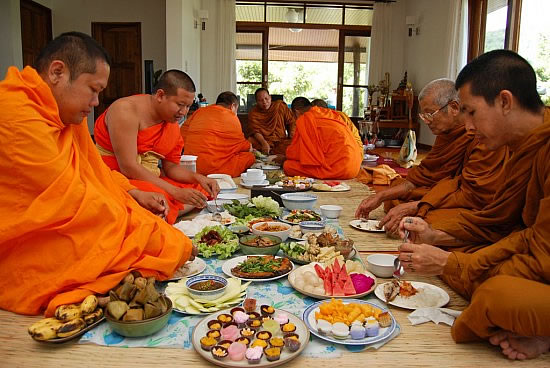
Thai monks eating together at a house blessing (Click to enlarge)
Khuan Ban Mai (ขึ้นบ้านใหม่), the blessing of a new house, is
regarded by Thai people as a very auspicious event. It celebrates the
completion of a new home by bringing together friends and family and
performing a Buddhist rite to encourage good fortune and prosperity for
the new dwelling and its inhabitants.
Before the ceremony takes place, the host will ask for advice from
monks or senior lay people to determine a suitable day for the ceremony.
The auspicious day depends on the day of the week and the time of the
year. For example, Saturday is considered to be an unlucky day for a
blessing as Saturn is believed to be the planet of misfortune.
Monks play important role in the house warming ceremony. The host
will usually invite an odd number of monks such as 5, 7 or 9 monks as
odd numbers are regarded as a lucky. Normally, the ceremony is held in
the morning until noon and afterwards the monks gather together to bless
the host and guests.
When the ceremony is finished, food will be offered to the monks by
the host followed by gift offerings. The gift set usually contains a
banana leaf cone holding flowers, candles, and joss sticks along with
necessary everyday items (drinking water, soap, detergent, toothbrush,
shampoo and comestibles such as biscuits or crackers). As well as these
individual gifts for monks there is usually a sealed envelop which
contains a donation to help support the temple.
As part of the ceremony, monks will sprinkle holy water on the host
and guests and throughout the new house. Each member of new household
will receive a string wrist-binding (white holy thread) from the monk as
a blessing. The holy thread, known as Sai Seen, is also entwined around
the main household Buddha image. Once blessing is complete the monks
leave and the guests will have lunch together.
A wide selection of food is prepared for the event and the choice of dishes is an important consideration. Thai curries are a popular choice and are often served with Thai vermicelli. Vermicelli is a long mung bean noodle
which is a traditional symbol of longevity and is served to promote the
long life of the host, long like the noodle. Serving curry with
vermicelli is also common for other ceremonies such as a wedding.
Dessert will also be served to everyone. Desserts with significant
names and meanings are chosen such as Foi Thong (sweet golden threads),
Thong Yip (sweet golden flower), Thong Yod (sweet golden dew-drop-like
ball) or even Kanom Chun (layered sweet meat). In Thai, “Thong” means
“golden” and desserts with this is in the name signify wealth and good
life for one and all. Kanom Chun dessert implies receiving respect and
promotion in your working life.
Khuan Ban Mai, the housewarming ceremony is a traditional part of
Thai life that has been passed from generation to generation. It is a
ceremony combining Buddhist beliefs with social values and Thai customs
and is a wonderful opportunity for family members to gather and enjoy
the moment together increasing warmth and closeness in the family and
with friends.
All this ceremonies can be conducted according to the local cultures and conditions for further details can be refer and study from Y.B.Nandana book Boudha Nitya Charanegalu.
ALL ABOUT USA
California
Deer Park Monastery meditation hall in Escondido, California
• Abhayagiri Buddhist Monastery, Redwood Valley
Abhayagiri Buddhist Monastery
Abhayagiri, or Fearless Mountain in the canonical language of Pali, is a Theravadin Buddhist monastery of the Thai Forest Tradition in Redwood Valley, California. Its chief priorities are the teaching of Buddhist ethics, together with traditional concentration and insight meditation techniques, as an effective way of dissolving stress.
Beyond all coming and going: the Tathagata
• Berkeley Zen Center, Berkeley
http://en.wikipedia.org/wiki/Berkeley_Zen_Center
| Berkeley Zen Center | |
|---|---|
 |
|
| Information | |
| Denomination | Sōtō |
| Founder(s) | Sojun Mel Weitsman Shunryu Suzuki |
| Rōshi(s) | Sojun Mel Weitsman |
| Priest(s) | Hozan Alan Senauke Maylie Scott (deceased) |
| Address | 1931 Russell Street, Berkeley, California 94703 |
| Country | United States |
| Website | www.berkeleyzencenter.org |
Berkeley Zen Center (BZC), temple name Shogakuji (正覚寺 Shōgaku-ji), is a Sōtō Zen Buddhist practice center located in Berkeley, California led by Sojun Mel Weitsman. An informal affiliate to the San Francisco Zen Center (SFZC),[1] BZC was originally founded in 1967 by Weitsman and Shunryu Suzuki as a satellite group for the SFZC.[2] Despite founding the center, Weitsman was not installed as abbot there until 1985, one year after receiving Dharma transmission from Hoitsu Suzuki.[3] Weitsman’s Dharma heir, Alan Senauke, lives on site with his wife Laurie Senauke (as of 1999) and also works for the Buddhist Peace Fellowship.[4] Another former teacher at BZC was Maylie Scott, who died in 2001.[5] In 1969 Zenkei Blanche Hartman began sitting zazen at BZC, receiving Dharma transmission from Weitsman in 1988.[1]
In 1979 the center relocated to its current location on Russell
Street—and today houses a small group of residents who live on site.[2]
• City Of Ten Thousand Buddhas, Talmage, Mendocino County
• Deer Park Monastery, Escondido
• Hartford Street Zen Center, San Francisco
• Hazy Moon Zen Center, Los Angeles
• Hsi Lai Temple, Hacienda Heights Suburb, Los Angeles
• Mount Baldy Zen Center
• Pao Fa Temple, Irvine, California
• Pacific Zen Institute, Santa Rosa, California
• San Fran Dhammaram Temple, San Francisco Thai Temple, West San Francisco
• San Francisco Zen Center, San Francisco
◦ Green Gulch Farm, Muir Beach
◦ Beginner’s Mind Temple, SFZC
◦ Tassajara Zen Mountain Center, Carmel Valley
• Shasta Abbey, Mount Shasta
• Sonoma Mountain Zen Center, Santa Rosa, Sonoma County
• Wat Buddhanusorn, Fremont, California
• Wat Mongkolratanaram, Berkeley
• Yokoji Zen Mountain Center, near Idyllwild
• Zenshuji Soto Mission, Los Angeles
See also: List of sanghas in San Diego County, California
http://attractions.uptake.com/california/family.html
 |
 |
 |
 |
||
| Princess Party |
Muppet Shows |
|
Face Painting Parties | ||
 |
 |
 |
 |
 |
 |
|
Puppet Shows with Stage |
Mascot Parties | Clown Parties | Pirate and Superhero Parties | Mermaid Parties |
Pet a Puppy at Your Party |
 |
 |
 |
 |
 |
 |
 |
 |
 |
|||
 |
|||||
 |
|||||
http://www.visitcalifornia.com/Things-To-Do/Family-Fun/
 The birth of Siddhārtha, Gandhara, 2-3rd century CE.
The birth of Siddhārtha, Gandhara, 2-3rd century CE.






